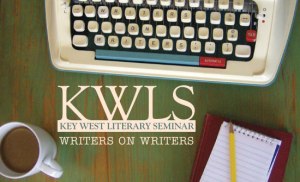Time to get reading some Writers on Writers
 I love this time of year for a few reasons. Holiday decorations in Key West are fun and appear to be getting more fun every year. I love the best of the year book lists that come out around now, to compare my own reading and to get ideas for books I might have missed. And I love the annual library display of books by writers appearing at the upcoming Key West Literary Seminar. The theme this time is Writers on Writers and the works encompass straight-up biography, meditative memoir and novels with real writers as fictional characters. Lots more detail, including the writers appearing and the schedules for both sessions, is available on the Seminar website. You can still register!
The books by this year's authors include some serious -- as in long and demanding attention -- books. But don't let that discourage you. While you may not be up for wading through a magisterial Literary Biography, especially during the distractions of the holiday season, there are plenty of other books that you may find surprisingly entertaining, as well as edifying.
I love this time of year for a few reasons. Holiday decorations in Key West are fun and appear to be getting more fun every year. I love the best of the year book lists that come out around now, to compare my own reading and to get ideas for books I might have missed. And I love the annual library display of books by writers appearing at the upcoming Key West Literary Seminar. The theme this time is Writers on Writers and the works encompass straight-up biography, meditative memoir and novels with real writers as fictional characters. Lots more detail, including the writers appearing and the schedules for both sessions, is available on the Seminar website. You can still register!
The books by this year's authors include some serious -- as in long and demanding attention -- books. But don't let that discourage you. While you may not be up for wading through a magisterial Literary Biography, especially during the distractions of the holiday season, there are plenty of other books that you may find surprisingly entertaining, as well as edifying.
We've just put up a display of books by Seminar writers at the Key West Library so if you're in town stop by and check it out (the display is in the Reference Department, turned over the summer into a more open reading room if you haven't been in recently).
As usual, I haven't read every single writer who will be appearing at the Seminar. But I have read enough to make some recommendations, especially for those who might feel apprehensive about this year's theme. My top choice is one of my all-time favorite nonfiction books: Parallel Lives by Phyllis Rose. I love this book so much I've bought it, given it to a friend, then bought myself another copy because I had to know it was available. We have it in the library, both in hard copy and as an ebook. Rose, a part-time Key West resident, writes about the marriages of five Victorian writers (or four marriages and one long-term cohabitation, that of George Eliot and George Henry Lewes). It's got the satisfactions of high-toned literary gossip -- most of these matches were, in some way, disastrous -- but also offers the chance to reflect on what it means for personal, domestic life when one partner is an artist, as well as the dynamics between men and women, both between individuals and within a context very different from our own.
The most difficult title to categorize but one of the best books I read this year is Geoff Dyer's memoir/meditation on D.H. Lawrence, Out of Sheer Rage. It's funny. It's thought-provoking. It's comforting, if you're prone to procrastination. I wrote a whole blog post about it a few months ago. It's very difficult to describe but it's intelligent and entertaining. And you should be able to read it a whole lot faster than I did, assuming you're not moving house after 14 years of accumulating stuff.
Some other nonfiction titles I can wholeheartedly recommend: Jane's Fame by Claire Harman -- if you're a fan of Jane Austen on print and screen, this is an interesting examination of why her five novels have retained such a high profile in our cultural lives. New Ways to Kill Your Mother by Colm Toibin, an essay collection about writers and their families. Especially insightful about Irish writers, not surprisingly, though the last couple sections on James Baldwin are masterful. Judith Thurman's biographies of Colette and Isak Dinesen are interesting and extremely readable (there's a reason she's a staff writer for The New Yorker). Her essays on artists and writers are collected in Cleopatra's Nose. As someone who grew up in and around Amherst, I'm always interested to hear more about Emily Dickinson so I can't wait to see Lyndall Gordon, author of Lives Like Loaded Guns (yes, that's a Dickinson biography), as well as biographies of Virginia Woolf, T.S. Eliot and Charlotte Bronte.
I'm looking forward to the discussions about writing about writers in fiction and there's a great selection there, too: Flannery O'Connor (A Good Hard Look by Ann Napolitano), Sylvia Plath (Wintering by Kate Moses), Stephen Crane (Hotel de Dream by Edmund White), Edith Wharton (The Age of Desire by Jennie Fields). Jay Parini, who will be at the Seminar has written novels about Leo Tolstoy (The Last Station) and Herman Melville (The Passages of H.M.).



